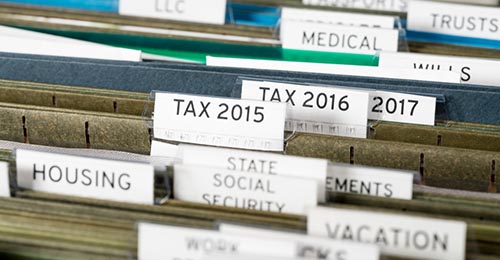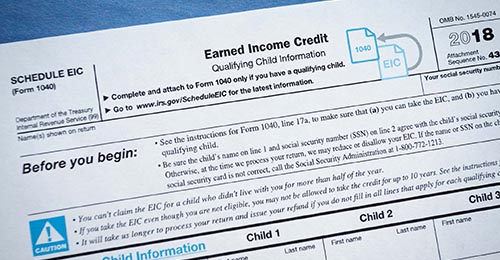Thinking of Dumping Old Tax Records?

Don’t Ignore Household Employee Payroll Tax Rules
September 1, 2020
Wealth Transition and Succession Planning: Best Practices for Businesses During COVID-19
September 15, 2020Article Highlights:
- General statute is 3 years
- Some states are longer
- Fraud, failure to file and other issues can extend the statute
- Records to dump
- Record to Keep Longer
Tired of having all those old tax records taking up drawer or closet space and collecting dust. Want to dump as much as you can? People often ask how long records must be kept and the amount of time IRS has to audit a return after it is filed.
How long to keep the records depends on the circumstances! In most cases, the federal statute of limitations can be used to help you determine how long to keep records. With certain exceptions, the statute for assessing additional tax is 3 years from the return due date or the date the return was filed, whichever is later.
However, the statute of limitations for many states is one year longer than the federal limitation. The reason for this is that the IRS provides state taxing authorities with federal audit results. The extra time on the state statute gives states adequate time to assess tax based on any federal tax adjustments.
In addition to lengthened state statutes clouding the recordkeeping issue, the federal 3-year rule has a number of exceptions:
- The assessment period is extended to 6 years instead of 3 years if a taxpayer omits from gross income an amount that is more than 25 percent of the income reported on a tax return.
- The IRS can assess additional tax with no time limit if a taxpayer: (a) doesn’t file a return; (b) files a false or fraudulent return in order to evade tax; or (c) deliberately tries to evade tax in any other manner.
- The IRS gets an unlimited time to assess additional tax when a taxpayer files an unsigned return.
If no exception applies to you, for federal purposes, you can probably discard most of your tax records that are more than 3 years old; add a year or so to that if you live in a state with a longer statute.
Examples: Susan filed her 2016 tax return before the due date of April 17, 2017 (the 15th fell on weekend). She will be able to safely dispose of most of her records after April 17, 2020. On the other hand, Don filed his 2016 return on June 1, 2017. He needs to keep his records at least until June 1, 2020. In both cases, the taxpayers may opt to keep their records a year or two longer if their states have a statute of limitations longer than 3 years.
Important note: Even if you discard backup records, never throw away your file copy of any tax return (including W-2s). Often the return itself provides data that can be used in future tax return calculations or to prove amounts related to property transactions, social security benefits, etc. You should also keep certain records for longer than 3 years. These records include:
- Stock acquisition data. If you own stock in a corporation, keep the purchase records for at least 4 years after the year you sell the stock. This data will be needed in order to prove the amount of profit (or loss) you had on the sale.
- Stock and mutual fund statements where you reinvest dividends. Many taxpayers use the dividends they receive from a stock or mutual fund to buy more shares of the same stock or fund. The reinvested amounts add to basis in the property and reduce gain when it is finally sold. Keep statements at least 4 years after final sale.
- Tangible property purchase and improvement records. Keep records of home, investment, rental property, or business property acquisitions AND related capital improvements for at least 4 years after the underlying property is sold.
Tax return copies from prior years are also useful for the following:
- Verifying Income. Lenders require copies of past tax returns on loan applications.
- Validate Identity. Taxpayers who use tax-filing software products for the first time may need to provide their adjusted gross incomes from prior years’ tax returns to verify their identities.
The IRS Can Provide Copies of Prior-Year Returns – Taxpayers who have misplaced a copy of a prior year’s return can order a tax transcript from the IRS. This transcript summarizes the return information and includes AGI. This service is free and is available for the most current tax year once the IRS has processed the return. These transcripts are also available for the past 6 years’ returns. When ordering a transcript, always plan ahead, as online and phone orders typically take 5 to 10 days to fulfill. Mail orders of transcripts can take 30 days (75 days for full tax returns). There are three ways to order a transcript:
- Online Using Get Transcript. Use Get Transcript Online on IRS.gov to view, print or download a copy for any of the transcript types. Users must authenticate their identities using the Secure Access process. Taxpayers who are unable to register or who prefer not to use Get Transcript Online may use Get Transcript by Mail to order a tax return or account transcript.
- By phone. The number is 800-908-9946.
- By mail. Taxpayers can complete and send either Form 4506-T or Form 4506T-EZ to the IRS to receive a transcript by mail.
Those who need an actual copy of a tax return can get one for the current tax year and for as far back as 6 years. The fee is $50 per copy. Complete Form 4506 to request a copy of a tax return and mail that form to the appropriate IRS office (which is listed on the form).
If you have questions about which records you should retain and which ones you can dispose of, please give this office a call.




